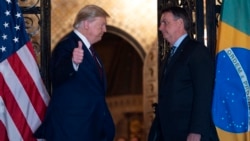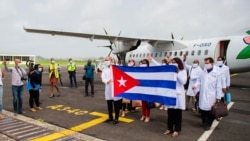Cuba’s medical missions were created in the 1960s and have deployed over 400,000 doctors to some 164 countries, Cuba says. They have become the communist country’s biggest export. In 2018 alone, they earned Cuba $6.3 billion, according to the Washington Post’s reporting. But the missions also have been controversial, particularly over Cuba’s treatment of its doctors.
One mission to provide Cuban doctors to Brazil’s ‘Mais Medicos’ (More Doctors) program has been the subject of much scrutiny. In June, the U.S. State Department – which, under President Donald Trump, has ramped up its attacks against the Castro regime – pressured the Pan American Health Organization (PAHO) to review its involvement in Mais Medicos.
In particular, the State Department asked PAHO how “it came to be the middleman in a scheme to exploit Cuban medical workers in Brazil,” why the group sent $1.3 billion to Cuba, why it didn’t seek the approval from its executive council for involvement in the Brazilian program, and what PAHO did with $75 million it collected from Mais Medicos.
PAHO – which receives 60 percent of its regional funding from the U.S. – agreed to conduct the review. U.S. Secretary of State Mike Pompeo welcomed that decision.
In response, the Cuban Ministry of Foreign Affairs (MINREX) published a statement in Granma, the official communist party newspaper. It criticized PAHO’s review:
“The alleged concerns of the United States about Cuba's cooperation, in this case about the ‘More Doctors’ program, are neither legitimate nor pertinent to be discussed at PAHO.”
The ministry’s statement is misleading.
Over the years, Mais Medicos did provide help for some of Brazil’s most medically needy populations. But the ministry’s response sidesteps the controversy and complaints of Cuban doctors.
Medicine for the neediest
Mais Medicos was created in 2013 by Brazil’s then-president, Dilma Rousseff. It was an emergency response to a campaign by Brazilian mayors to call attention to the difficulty of hiring and keeping doctors in the country’s marginalized communities. Brazil is the fifth-largest country in the world in land area – bigger than the continent of Australia.
Despite Mais Medico’s ambitions to reform and expand basic healthcare centers, place medical professionals in 4,058 Brazilian municipalities and help doctors pursue specializations, it only managed to fill 900 of the 18,240 vacancies.
This is where Cuba came in: The country filled most of the remaining 17,000-plus vacancies with Cuban doctors. The program provided more than 60 million Brazilians with access to family doctors and free healthcare for the first time.
At its inception in 2013, some Brazilian politicians criticized Mais Medicos as an agreement with “a dictatorship.” But it was approved, and PAHO was tapped to help smooth the Brazil-Cuba partnership. PAHO monitored the program’s results and impact, keeping 5 percent of the program’s funding for itself through administrative fees.
Doctors in Mais Medicos initially were paid around R$10,000 (Brazilian reals) per month (around US $4,167) from Brazil’s federal government. However, Cuba’s government kept for itself approximately 70 percent of the salaries of the participating Cuban doctors.
Doctors rebel
This changed after February 2014, when a Cuban doctor broke with the program over these payment terms and Brazilians learned of them. Brazil’s then-health minister, Arthur Chioro, then said the Cuban doctors would start being paid about $1,250 (US) a month.
In the years that followed, however, hundreds more Cuban doctors spoke out in complaint about salary being withheld. As The New York Times reported in 2017, at least 150 Cuban doctors had sued in Brazilian courts, demanding to be treated as independent contractors.
This was the case for Anidys Carrandi, who left Cuba (and her two sons) in 2014 to join the program. She stayed until 2017, working in Itamonte, a city in the south of Minas Gerais state. When her contract expired, Carrandi, who had married a Brazilian and brought her sons to the country, sought to renew it directly with Brazil’s government.
She eventually won the right to work as an independent contractor and did so for two more years. “Cuba saw this as a betrayal to the country, and I received an unannounced visit from the coordinator and Cuban consul. They came here and told me, ‘You know you won’t be able to return to Cuba for eight years?’ ”
Carrandi now is the president of the nonprofit association Doctors Reserve (founded in August) with a goal of organizing medical missions of Cuban doctors who “deserted” their homeland.
A cut for PAHO
In 2018, a group of Miami-based doctors who had worked for Mais Medicos filed a lawsuit claiming that PAHO had earned $75 million from what they called a “slave trade.” As the Miami Herald reported, Samuel Dubbin, the lawyer representing the plaintiffs, cited a Brazilian audit of the Mais Medicos program which suggested that the different treatment of the Cuban doctors under the program violated article five of the Brazilian Constitution, which states “all are equal under the law.”
The lawsuit states that, since the program’s start, PAHO received $1.5 billion from Brazil – $1.3 billion of which went to Cuba and $75 million of which was kept by the organization.
Brazil’s Senate Social Affairs Commission estimated in 2018 that between 2013 and 2017, Brazil’s government sent R$7 billion (around US $2.1 billion in February 2018) to Cuba.
Brazilian news outlets have reported on the controversy. In September 2017, O Antagonista obtained spending data of the program, showing that in four years, Brazil’s government transferred R$5.7 billion ($1.8 billion in September 2017) to PAHO – of which around R$ 3.2 billion ($1.02 billion) was kept by Cuba. Some R$1.3 billion ($415 million) was used for airline tickets and PAHO’s administrative fee.
A 2016 PAHO audit, which was reported on by the Miami Herald, found “potential problems with its Mais Medicos deal” and recommended setting aside funds to "cover claims by Cuban doctors who had already filed lawsuits in Brazilian courts claiming unequal working conditions.”
At publication time, PAHO had not replied to a request for comment.
Politics and pullback
On Nov. 14, 2018, Cuba announced it would repatriate some 8,300 doctors from Brazil – given what it called then-President elect Jair Bolsonaro’s “unacceptable conditions,” which made “it impossible to maintain the presence of Cuban professionals in the program.” The conservative Bolsonaro celebrated the Cubans’ departure as a victory in the war against leftist regimes.
The Bolsonaro administration’s treatment of communist Cuba and Venezuela tracks with the hawkishness of the Trump administration. Since 2017, the U.S. under Trump has reimposed limits on tourism, adopted more severe policies on Cuban migrants and refugees and passed new sanctions tightening the embargo imposed during the Cold War.
Since the end of the Mais Medicos program, lawsuits from Cuban doctors have garnered the attention of the State Department. In September 2019, it heard firsthand accounts of alleged abuses in medical missions from two Cuban doctors. That same month, it imposed visa restrictions on Cuban officials for “exploiting Cuban doctors.”
In September, Democratic Sen. Bob Menendez and Republican Sen. Marco Rubio introduced the “Combating Trafficking of Cuban Doctors Act,” which, among other things, would declare the Mais Medico program and deployments to treat COVID-19 to be human trafficking.
“Cuba’s medical missions abroad are not humanitarian, but in fact a calculated, coercive money-making scheme by a regime relying on indentured servitude to fill its coffers,” Menendez said in announcing the legislation.
In light of the coronavirus pandemic, over 1,500 Cuban doctors have been deployed to respond to outbreaks in various countries. In July, Human Rights Watch (HRW) said those countries should press the Cuban government to change its regulations on brigades, as it “imposes draconian rules on doctors deployed in medical missions globally that violate their fundamental rights.”
HRW wrote that since Cuba’s first medical mission in 1963, it has “crafted repressive norms that regulate the lives of those deployed abroad.” A relationship with anyone whose “actions are not consistent with the principles and values of the Cuban society” is considered a disciplinary offense, and romantic relationships should be “immediately disclosed” to supervisors, HRW said.
If doctors commit infractions, punishment ranges from withholding wages to being sent back to Cuba or being banned from the country for eight years.










